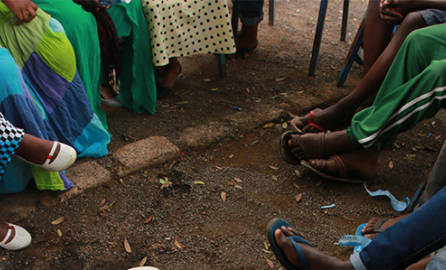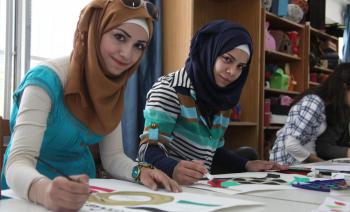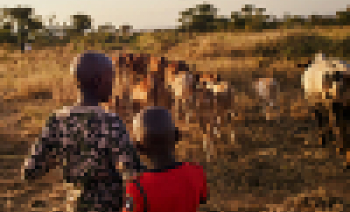In the aftermath of the Westgate shopping mall massacre in Nairobi which claimed at least 67 lives in 2014, volunteers have come together to mentor youths at risk of being recruited by radical violent groups and criminal gangs in Kenya. The project, funded by the EU Trust Fund for Africa, is part of a wider effort by the Kenyan government, NGOs and development partners to understand and address the root causes of violent extremism among the country’s young population.
Kamilo Mohamed is one of the volunteers from Eastleigh, a neighbourhood in Nairobi home to thousands of Somalis who escaped war and poverty, and which has become a thriving commercial hub drawing goods from across Africa, Asia and Europe. However, its high population of young people, many of whom struggle to find employment, makes Eastleigh a target area for violent extremist recruiters.

“Local mentors are best placed for this kind of work, as it’s easier for them to identify who is vulnerable – who is being targeted, who is known in the local community to have associations with criminal gangs, people with radical views,” said Kamilo.
“I come from the same areas as the mentees, so I know the challenges they face,” said Kamilo. “What makes me different is I’m doing something for my life, therefore I’m not as vulnerable as they are.” Not only does she offer advice and a listening ear, Kamilo also acts as a role model for young people to follow, representing an alternative path.
Kamilo’s work to understand the elements of vulnerability underpins the Conflict prevention, peace, and economic opportunities for youth project funded by the EU Trust Fund for Africa. Activities under the three-year project focus on Kenya’s marginalised areas – the North-East, Coast and some of Nairobi’s suburbs such as Eastleigh – where economic development lags behind many other parts of the country. One component is run by the Royal United Services Institute (RUSI), following on from previous work with the EU to implement Strengthening Resilience to Violent Extremism (STRIVE) in the Horn of Africa. It seeks to provide evidence on what works in reducing violent extremism.
|
Spotlight on the EU Trust Fund for Africa The EUTF for Africa was launched at the Valletta Summit on Migration on 12 November 2015 by European and African partners. It aims to contribute to addressing the root causes of irregular migration, forced displacement and instability in the Sahel and Lake Chad region, the Horn of Africa and North Africa, through programmes to create employment opportunities, strengthen resilience, improve migration management and promote conflict prevention. |
Following research, RUSI has identified three categories of factors that usually work in combination to enable the recruitment of small numbers of people by extremist groups. There are structural motivators, such as high levels of youth unemployment, political, economic and social exclusion, proximity to violence or criminality, dysfunctional families and poverty; individual incentives, which include seeking a sense of purpose, status and belonging; and enabling factors: online and community networks linked to violent extremism, as well as peer pressure.
In Kamilo’s words, the young people they are supporting “have low self-esteem, they don’t have critical thinking, they can’t make decisions on their own. They are unemployed - which makes them good targets for violent radicals. Most of them come from a low background or ghetto, they use drugs, they’re involved in criminal activities.”

The mentors try to counteract the ‘pull factors’ towards violent extremism through mutual support groups and weekly one-to-one meetings. There are group discussions on topics such as self-esteem and self-actualisation, with up to 40 participants. The mentees mostly range from 18 to 24 years old, the majority (around 70%) of whom are male.
Kamilo is one of seven volunteers working in Eastleigh, while another team focuses on nearby Majengo – both neighbourhoods about 10 km from Nairobi’s Westgate mall. The project also supports other volunteers to mentor young people in four districts in Mombasa, Kenya’s second-largest city. “Each area has seven mentors and five mentees each, so there are around 200 in the programme,” said Kamilo.
Watch Mukhtar Abdi Ogle, Secretary of Strategic Initiatives in the Office of the Presidency, on the factors behind young people’s vulnerability to recruitment; Kamilo Mohamed on her experience volunteering as a mentor for at-risk youth; and Greg Schira, project manager at RUSI, on the impact.
Building trust
The hardest part is building trust, according to Kamilo. “It is a process. I am not going to open up to anybody, I’m not going to share my soul with strangers. It takes some time. We share our ideas, our problems - I share my experiences, I empathize with them, so we can be on the same page. We become friends, we talk of more common things, what’s new in the hood…”
Often, the challenge for mentors is knowing whether their message is sinking in, amid so many other influences. “You can have a mentee in a session, talking and sharing, but you know at the end of the day you have to go back home, you have to separate. You know [extremist recruiters] still approach those people in the hood, maybe monitoring their movement in the area.”

Kamilo also faces criticism from some members of the community who ask her to ‘mind her own business’. “People call us informants, [they say] ‘you’re gathering information from us, who are you working for’; you see, the community has these kinds of people who just don’t want these youths to have a functional life.”
Nevertheless, the mentorship programme has already seen encouraging results. “What we offer, it’s like psychological first aid,” said Greg Schira, Project Manager at RUSI. “We have youth at risk who come one year later and say, I decided to change and I’ve decided to do something with my life. When we think about the few who managed to really pick up the pieces and change their life, it’s really something beautiful.”
Schira believes the project could be scaled up, though it depends on finding committed, dedicated mentors embedded in communities.
“Without commitment and passion, without volunteering, it does not work,” said Schira. “What we’ve learned is a lot about empathy, about bringing care. Those youngsters, nobody cares about them, nobody showed them love, nobody gives them hope. So the only one who gives them a kind of sense in their life is the recruiters for the terrorist networks. It is difficult for them to have an alternative purpose.”
Addressing Root Causes
Meanwhile, the Kenyan government is also working to support vulnerable youth in a variety of ways.
“What we have gathered from young people is that it’s lack of opportunities for a dignified livelihood that contributes to recruitment,” said Mukhtar Abdi Ogle, Secretary of Strategic Initiatives in Kenya’s Executive Office of the Presidency. “This inability to generate income through certain employment has mis-served them, which is a function of the education system, and has been one driver of young people’s hopelessness.”
One area of government investment is skills training geared towards jobs in farming, entrepreneurship and digital enterprise – coupled with a drive to counter negative perceptions of farming and self-employment among young people.

“Young people are very much preoccupied with white collar jobs,” said Ogle. “But I think this initiative has shown us there is dignity in farming. Young people are idling around, especially in the coastal area, and becoming victims of drugs. [That] programme was able to refocus them on farming as a more meaningful, dignified and productive way of living their lives.”
“The government's support has also been helpful to create links between young people across six counties of the coastal region of Kenya on what works beyond farming. Like having an entrepreneurial spirit; for them to deploy skills, apply in a practical sense what they’ve learned in school to shape a better future for themselves. [We’ve supported] functional financial literacy on how to do small business. This has been very critical and very successful,” said Ogle.
The other branch of Kenya’s policy response to young people’s disillusionment relates to governance. “There is disillusionment with poor governance in the counties and communities they come from. So we realise leadership matters. The next generation of leaders, we train them to fix the gap, to tell us what we need to do.”
“Through such engagements we craft a strategic initiative focused on not only disrupting the recruitment process, but to have young people as partners for peace. So as to restore their dignity as young people, and appreciate there is no dignity in violence.”
Photo credits: STRIVE/RUSI







Log in with your EU Login account to post or comment on the platform.